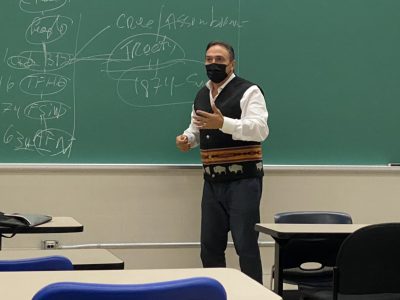This profile was part of the Faculty of Public Affairs’ Generation FPA series, which highlighted up and coming alumni who graduated between 2008-2018. The series was published in 2018.
Ashley Wamboldt is a Senior Project Officer in Correctional Service of Canada (CSC) within the Population Management & Transfers Division of the Security Branch. She first joined CSC through the Institute of Criminology and Criminal Justice’s field placement program and eventually landed a full-time position.
 Why did you choose criminology?
Why did you choose criminology?
My childhood dream was to be a police officer. But as I learned more about the criminal justice system, I realized that being a police officer wasn’t for me: I was more interested in preventing crime than reacting to it.
Would you say your work helps prevent offenders from committing crimes?
Our mission at Correctional Service of Canada is to rehabilitate offenders and bridge them back into the community when it is safe to do so. We make sure they’re properly supported before they are reintegrated back into society. This means that each and every person who works for CSC contributes to keeping our communities safe.
One of my key portfolios is ensuring that community parole officer positions are adequately resourced across the country. However, as a project officer within the government, I could be tasked to manage any type of project, which I find exciting.
How did you land a job at the Correctional Service of Canada?
My first job here was through the field placement program at Carleton. My minor was in psychology and when I started, more resources were being dedicated to the mental health of offenders. So thanks to hard work and some luck, I kept getting new assignments. Before my field placement ended, I was transitioned to the Federal Student Work Experience Program (FSWEP) and was eventually bridged into a full-time position.
How did your experience at Carleton help you prepare for your career?
The Criminology Program at Carleton provided me with the skills and knowledge necessary to work within the criminal justice system. Not a single day goes by in my career where I am not applying one or more aspects of law, sociology, psychology or statistics. My education also helped strengthen my ability to think strategically and to provide recommendations. I’m often expected to understand the linkages and impacts between various areas of the business and then successfully communicate this understanding to senior managers.
Any plans for the future?
I try to stay open to possibilities. However, I’m naturally drawn to projects that intersect data and technology, so we’ll see what the future holds.
Do you have any advice for students preparing to enter the workforce?
Try to absorb and learn everything you can and take opportunities as they come. It’s also important to realize that your education never stops and that work is continuously evolving.
Discover Criminology and Criminal Justice
Thursday, January 4, 2018 in GenFPA, Institute of Criminology and Criminal Justice
Share: Twitter, Facebook



